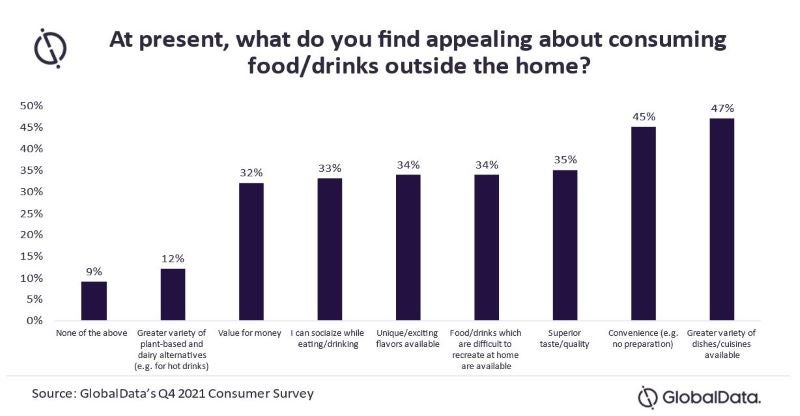As the travel industry’s recovery starts to gather pace, many tourist boards are looking to differentiate themselves from rival destinations by focusing on gastronomy, rather than traditional natural hot spots, cities, or coastal locations.
According to GlobalData’s Ads Database, destination marketing organisations (DMOs) from Turkey, Malta, and Indonesia have focused on their national cuisine to entice new tourists. Such marketing campaigns have included glossy images and short videos covering traditional cooking methods and consumption.
DMOs are reacting to an increased interest in global cuisine
According to a GlobalData Q4 2021 Global Consumer Survey, 47% of respondents said that they find the broader availability of cuisines the most appealing reason to consume food and drink outside the home, highlighting the global appetite for experiencing new flavours. It is reasonable to assume that the same sentiment applies to tourists within a destination. Many will be enthusiastic about encountering the local culture and customs, including food and drink.
The pandemic may have also broadened the palates of many tourists, despite the closure of many restaurants. As these businesses needed to adapt to pandemic restrictions, there was a growth in the popularity of food delivery services such as Just Eat, Deliveroo, and Uber Eats. These services have made international cuisines more accessible than ever due to the low-touch service, intuitive smartphone app, and efficient mobile payments system. This trend is unlikely to slow either, with the food delivery market set to grow at a compound annual growth rate (CARG) of 7% between 2021 and 2025, according to a 2021 GlobalData Food Insights and Trends report. As a result, millions of individuals will continue to sample new cuisines and flavours from their local restaurants.
In response to this change in consumer tastes, tourist boards have recognised an opportunity to use regional cuisine to create original marketing campaigns that can convey local culture with the tourist experience. However, it is important to note that linking destination marketing with the gastronomic experience is nothing new. Still, this utilisation is likely to increase due to the aforementioned changes in consumer behaviour. As this momentum gathers, we will see a link between tourist boards and tourism companies in how they brand specific products and destinations, creating more impactful advertising campaigns.
Travel companies are catching on to the gastronomy trend
Travel companies have realised the potential benefits due to DMOs using gastronomy to give the destination a unique selling point. Tourism organisations such as travel intermediaries, cruises, and hotels have been quick to catch on by centring social media engagement and marketing campaigns around food culture. Britain’s largest high street travel agent, Hays Travel, recently posted on Twitter asking consumers how many foods from around the world they have tried. The post was followed by the tags #travel, #cuisine, and #food, helping develop a trend on social media. In addition, the reopening of the Four Seasons Hotel, in Bahrain, saw the hotel create a digital media campaign around its new sushi restaurant. Furthermore, P&O Cruises also spotlighted Barcelona with a short documentary surrounding its local tapas cuisine, presented by renowned Spanish chef Jose Pizzaro.
If this gastronomy advertising trend continues in the travel industry, trade and tourist boards will create marketing content that compliments both destination and the tourism product, helping to push international tourism’s recovery further.





